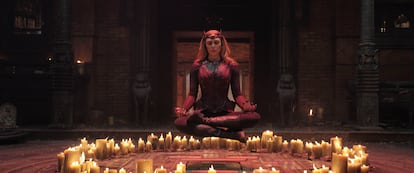Elizabeth Olsen: ‘I like that my superhero fails’
The actress premieres her fifth Marvel film, ‘Doctor Strange in the Multiverse of Madness,’ saying, ‘If we only see successful characters, the public may believe that their mental problems aren’t important’


Elizabeth Olsen was born into the limelight. Her older sisters, Mary-Kate and Ashley Olsen, had spent their days on the set of the popular TV sitcom Full House since they were breastfeeding, and she watched them grow up as the most famous girls in the world, becoming the subjects of brutal public scrutiny. Elizabeth started acting with the twins when she was six years old, but she thought about giving it all up when she saw how the press treated Ashley’s eating disorder. “We almost had car accidents because of the paparazzi,” she recounted in 2011. Those experiences may have helped her develop a thicker skin. Now, she is known as one of the most famous superheroines in cinema and one of the most recognizable celebrities today.
The actress, who premieres Doctor Strange in the Multiverse of Madness this Friday, admits that she deals with her celebrity status by staying away from social media, as well as avoiding any questions that touch upon her private life. What experiences have helped her relate to her character’s fragile mental health? “It’s something personal,” she answers between laughs in a video call with EL PAÍS. She asserts, though, that her experiences helped her to understand Wanda, also known as Scarlet Witch, at her worst. “I need to have some sort of access point that comes from a personal and private space. Wanda has never wanted to really take advantage of her power, and the Avengers are people who are happy to take advantage of their power. I don’t really care to take advantage of my privilege of being in the public eye.”
Wanda, who struggles with grief and post-traumatic stress, has become a particularly relevant character at a time when mental health is a global issue. Olsen, who told Elle magazine that the panic attacks she suffered years ago helped her connect with her disorder, has become “her own best advocate.” “If we just keep watching people succeed and not fail, as we have struggles in our own lives, we think everyone else has figured it out.”
“I don’t ever approach her thinking she’s crazy. She’s, um, processing and is struggling to process some of the experiences that she’s had,” she explains. That development, which began in the TV series WandaVision, humanized her character and made her appeal to young girls to an extent that Disney hadn’t anticipated. “Wanda is someone who we allow to make mistakes and go through big struggles, to fail and maybe make the wrong decisions. She isn’t a perfect role model, but I do think she is an example of a woman who has strength and power and is also deeply sad and has a lot of loss. Her vulnerability is her strength. But, you know, she also makes big, big mistakes, but she’s an independent thinker.”
In the series, Wanda creates a parallel reality in the form of a television sitcom in which her android husband is still alive and they live as the parents of twins in an idyllic residential neighborhood. When the sorcerer Strange (Benedict Cumberbatch) asks for Wanda’s help in healing a rift between universes, we find her where we left off, dealing with her newfound powers and the trauma of losing Vision. Wanda, like Elizabeth, did not set out to be the center of attention. “I was just surprised by how much space I’ve taken up in the Marvel Cinematic Universe,” she says. “I was really happy being on the sidelines. The biggest surprise has been people caring about this character. I always thought people love the Marvel characters for being so witty and funny and charming, and I was surprised that people even cared about our characters. What Jac Schaeffer wrote for WandaVision is what made that show special.”
Having endured more trauma than any of her male peers, Olsen knows Wanda Maximoff better than anyone. She even had to explain to Sam Raimi, her fourth director at Marvel, about her life odyssey. The person in charge of the original Spider-Man film trilogy has acknowledged only having seen fragments of the Disney+ series, essential to the plot of this film. “He’s very collaborative. He was very curious about my opinions on how to play certain aspects of the film,” she explains. Given that the characters’ story was written by Marvel, and that he does not decide their trajectories, Raimi had to get creative: “He’s also very playful in how he chooses to film things with his lenses and the camera movement that he chooses.”
After five Marvel projects, Olsen understands intuitively the inner workings of the franchise’s gigantic machinery. She now tiptoes around the edges of one of the most secret projects in the world, full of surprises and cameos. At the time of the interview, like the journalist, she had not yet seen the finished film. While they were shooting she didn’t even know the ending: “It’s fun to talk about a movie that you can’t say anything about,” she jokes. “I don’t even know what is actually in the movie and what’s not. They do give us quite a few pages of how to handle specific questions that I glance over. But I feel like at this point I know how to play the game of promoting a Marvel project.”
Her diplomacy came through when, on the red carpet in London, she was asked about the film’s ban because of its inclusion of América Chávez (Xochitl Gómez), a Latina multiversal traveler and lesbian with two mothers: “It’s definitely disappointing for fans, but I also am proud to be a part of a film that represents and stands for inclusion and diversity.” A month ago, Argentine producer Victoria Alonso emphasized her goals as head of Marvel: “LGBTQ+ people deserve an origin story. As long as I am at Marvel Studios I will fight for representation for all of us.” Given the surprise commercial success of Encanto, Chávez could well end up as a toy-store favorite. “People are allowed to have their own opinions, and I just get the scripts and I try to do what I can with them, hopefully in an entertaining way that stays true to the characters.”
Will she take on another Marvel mega-production? “I didn’t know what Dr. Strange was going to be about until about a month before showing up. I don’t know what the future is for Wanda. I always want to know what the fans would like to see next.” Olsen leaves her future in the hands of the fans and the comics. She knows that she’s just one more piece in the 10-year plan that Marvel super-producer Kevin Feige and his team are already plotting. Like Wanda, she isn’t scared anymore: she feels comfortable out of the spotlight.
Tu suscripción se está usando en otro dispositivo
¿Quieres añadir otro usuario a tu suscripción?
Si continúas leyendo en este dispositivo, no se podrá leer en el otro.
FlechaTu suscripción se está usando en otro dispositivo y solo puedes acceder a EL PAÍS desde un dispositivo a la vez.
Si quieres compartir tu cuenta, cambia tu suscripción a la modalidad Premium, así podrás añadir otro usuario. Cada uno accederá con su propia cuenta de email, lo que os permitirá personalizar vuestra experiencia en EL PAÍS.
¿Tienes una suscripción de empresa? Accede aquí para contratar más cuentas.
En el caso de no saber quién está usando tu cuenta, te recomendamos cambiar tu contraseña aquí.
Si decides continuar compartiendo tu cuenta, este mensaje se mostrará en tu dispositivo y en el de la otra persona que está usando tu cuenta de forma indefinida, afectando a tu experiencia de lectura. Puedes consultar aquí los términos y condiciones de la suscripción digital.








































